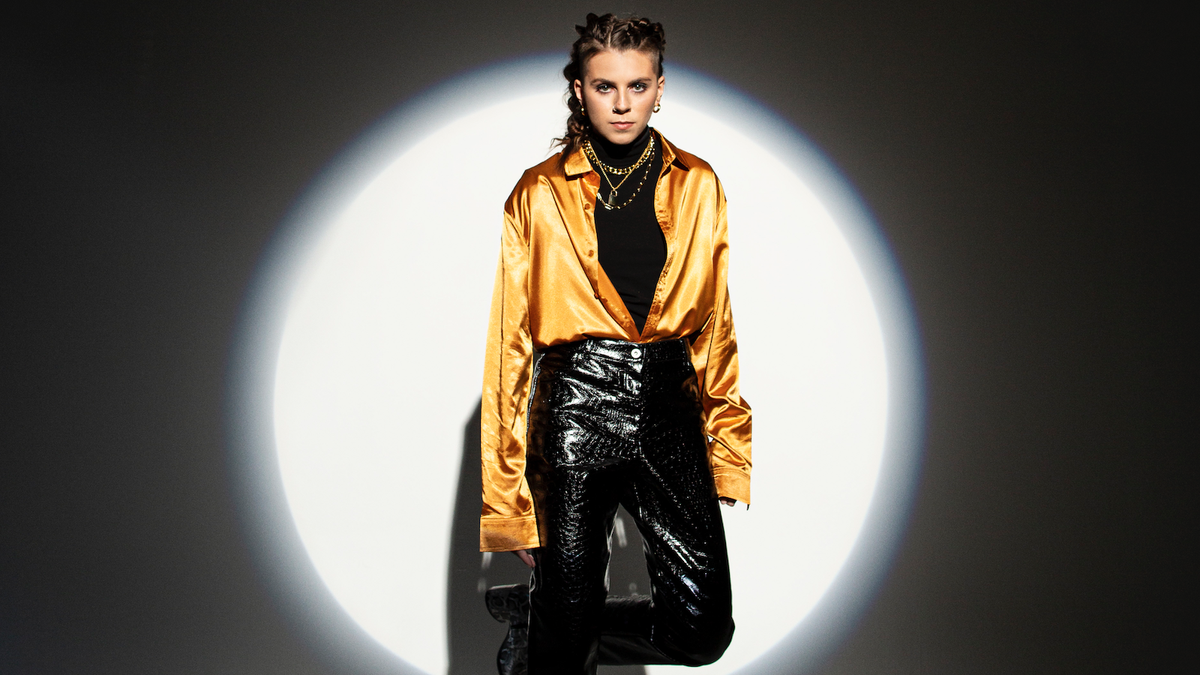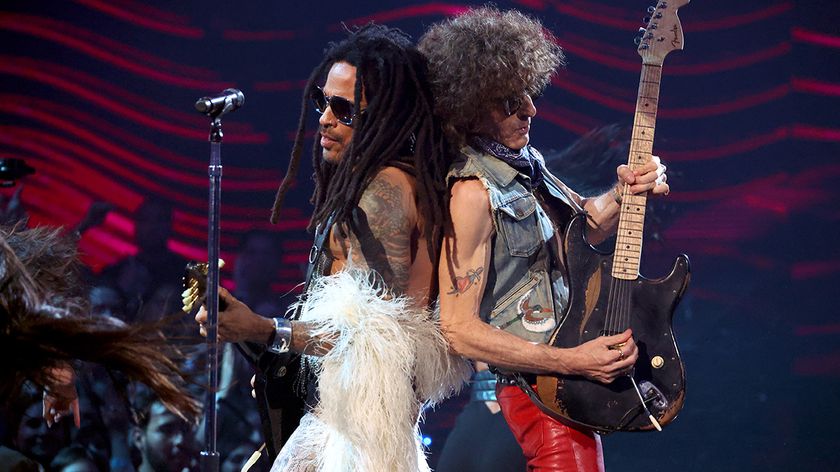PVRIS: “It’s just about wanting to be truthful and authentic to what is actually happening behind the scenes”
On their poignant and empowering new album Use Me, PVRIS frontwoman Lynn Gunn takes charge and embraces her well-earned turn in the spotlight

Despite always being at the forefront of their creative output, Lynn Gunn has often been overshadowed by her bandmates in PVRIS – and not just because of how small she is as a person when standing beside them. For years, Gunn felt the pressure to minimise her voice and downplay how responsible she was for her band’s work – partly out of fear she’d look selfish, but mostly because when you’re a woman in rock and alternative music, owning the spotlight comes with significant risks.
But for PVRIS album #3, Gunn has stepped up to the plate and defiantly rejected the culture that pushed her into the shadows. From the cover art of Use Me to the narrative surrounding it, she’s unashamedly celebrating that it’s her work to be proud of – that she’s responsible for all of the summery pop bops and searing rock jams that fill its tracklist, and goddammit, she isn’t going to sacrifice that credit because some major-label dickhead in a suit warned her against it.
And so she should take the credit – Use Me is, in so many ways and for so many reasons, PVRIS’ most ambitious and outstanding release to date. It presents a much louder, prouder, more confident and fearless Gunn than ever before – and, not to mention, a sonic palate downright bursting at the seams with top‑notch beats and brilliant production.
When we get a hold of Gunn to chat about the album, she’s hanging out at the beach, her laugh bright and her enthusiasm infectious. This is the age of PVRIS 2.0, after all, and she’s embracing it with her head raised high.
This record shows you taking a stand as a songwriter, stepping up to the forefront and owning your role as the main creative force in PVRIS. Has it been a liberating journey so far, being able to embrace that spotlight and lead the charge on LP3?
It’s not even really been about the spotlight, to be honest. It’s just about wanting to be truthful and authentic to what is actually happening behind the scenes, and to be transparent and open about the creative process – not having to dodge any weird rules about the format of the band or things like that.
In the past, I used to kind of shrink down whenever I’d talk about writing and collaborating, because I felt like I couldn’t really take that charge or talk about how involved I was – just to, like, uphold the dynamic. We had this perception of what a band’s dynamic should be from watching and studying a lot of the bands that we came up playing with, but that was never really how PVRIS worked. So it just feels really freeing, in the sense that I can actually genuinely create, and talk about the creative process as openly as possible.
Three albums down and almost a decade in, what made now the right time to make such a monumental leap forward?
It was kind of naturally just happening anyway, with the way that this last album was written. The whole process of making the album was very – it was all pretty new and very scattered, and just a very different way of making an album as opposed how it has been in the past. I worked on it pretty much alone, and I had to do a lot of stuff on the fly, as far as tracking instruments and writing lyrics went. It was really chaotic for the album to get finished, and the easiest way for that to happen was to just leave it with me and let me work on it alone.
Get The Pick Newsletter
All the latest guitar news, interviews, lessons, reviews, deals and more, direct to your inbox!
Everybody in the band is in a different place in their life now as well, as far as where we are when we’re off tour and we’re not all together. But it all felt very natural in the end. It’s been the best dynamic for everybody moving forward, I think – which has been very comforting as well.
Working on the fly and in more isolated settings, does the atmosphere around this record feel different to you, compared to the first two?
I think as far as creating on the fly went, there were a lot of similarities but also a lot of differences. It was similar in the sense that there would be no structure or conventional time limit on how things were made. The first two albums were definitely made in a bit more of a traditional fashion, as far as going, “Alright, we’re going to lock ourselves up for this long with this producer, and we have to leave at this time with an album ready to go.” But within that small bit of structure, there was a lot of going with the flow and tracking as we were writing, writing as we were tracking and creating very intuitively.
And with this album, it was definitely very intuitive in that sense of there not being any structure. Every song was treated and approached differently, from the writing to the tracking to the production. But as far as the freedom in creating it went, and I guess the intention behind the album – that’s always been the same. At the end of the day, however a body of work is made, the main intention is that we want to make something that feels exciting and refreshing. I always want that excitement to translate to the record, too – and to do that, you kind of just have to roll the dice and hope for the best.
This record totally blew me away how many different sounds and styles you explore, and how you bring them all together into this celebration of pop music and the genre’s innate diversity. Going into the writing process for this record, were you excited to mess around a lot and throw a bunch of stuff at the wall to see what would stick, or did you have a pretty clear vision for what you wanted it to be at the start?
It was a little bit of both. The most important thing about working with whoever I’m collaborating with is knowing that the dynamic is going to suit us all. From the core, everything needs to be coming from me, and will be, and needs to be steered by what feels right for me. It’s all about bringing in the right collaborators – because that can really enhance the art, or it can flip an idea on its head and make it something that really compliments whatever I’m bringing to the table.
This has definitely been the closest to where I’ve imagined PVRIS being since really early on, and I think part of that comes from finally saying, “F*** it” and just going for it. And having the right collaborators to help bring that to life, and crack that vision further… Like dude, JT Daly was such a great, great, great producer, and such a great partner to have in making this album. We were very much on the same page, and he really understood where I wanted to take this album.
JT is a really diverse producer as well, just as far as what he’s capable of doing. My intention is always to just focus on making a great song, and I like to always have something new and exciting to drive that in the production. The song might be something very simple when it’s written down, or something that’s very intentionally crafted, but if it was masked in a different style of production, might be something totally different.
And JT was really good at helping me find what I was looking for with these songs, and knowing when to dig into the aggressive parts and when to pull back, and understanding the dynamic of that. I could nerd out about JT for hours, to be honest!
Can we nerd out about guitars for a little?
Hell yeah we can! We were using a little bit of everything. JT has a Jaguar that I played so much – we tracked using that guitar for pretty much everything, actually. I’ve used my Jazzmaster and Mustang a bit, too… I’m a Fender person all the way. I just prefer the sound, I prefer the styles, and I think they’re a much more timeless brand of guitar. And we have a really great relationship with them – they’ve always been really supportive of our band and provided us with instruments whenever we’ve need them, so I’m ride or die with Fender for life.

Ellie Robinson is an Australian writer, editor and dog enthusiast with a keen ear for pop-rock and a keen tongue for actual Pop Rocks. Her bylines include music rag staples like NME, BLUNT, Mixdown and, of course, Australian Guitar (where she also serves as Editor-at-Large), but also less expected fare like TV Soap and Snowboarding Australia. Her go-to guitar is a Fender Player Tele, which, controversially, she only picked up after she'd joined the team at Australian Guitar. Before then, Ellie was a keyboardist – thankfully, the AG crew helped her see the light…

“We had 15 minutes left, and it was time to go… I just started playing that riff. Then Lenny goes, ‘Whoa, what’s that?’” Lenny Kravitz guitarist Craig Ross reveals the serendipitous roots of a Kravitz classic

“The concept of the guitar duel at the end was just appalling”: Crossroads is an essential piece of '80s guitar lore, but not every guitar legend was a fan of the film








